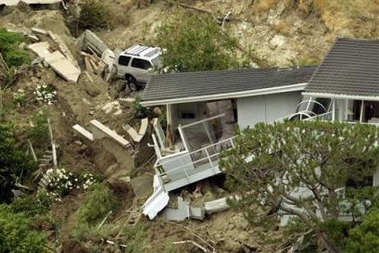 Calif. Landslide Sends 18 Homes Crashing
Calif. Landslide Sends 18 Homes Crashing
|
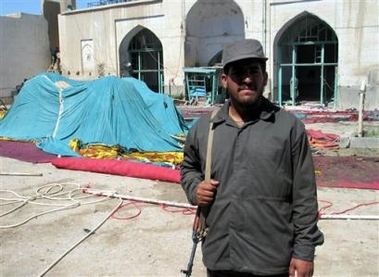 Afghan Mosque Blast Kills 20, Wounds 42
Afghan Mosque Blast Kills 20, Wounds 42
|
|
LAGUNA BEACH, Calif. - A landslide sent 18 multimillion-dollar houses crashing down a hill in Southern California early Wednesday as homeowners alarmed by the sound of walls and pipes coming apart ran for their lives in their nightclothes. At least four people suffered minor injuries
About 1,000 people in 350 other homes in the Blue Bird Canyon area were evacuated as a precaution. In addition to the houses destroyed, several homes were damaged and a street was wrecked when the earth gave way around daybreak in this Orange County community about 50 miles southeast of Los Angeles.
"The pipes started making funny noises and the toilet sounded like it was about to explode," said Carrie Joyce, one of those who fled. "I could see one house, huge, we call it `the mausoleum,' 5,000 square feet or more. It had buckled, the retaining wall in the front of it was cracked. It just looked like the whole house was going."
Residents were alerted to the slide shortly before 7 a.m. by popping and cracking as power poles went down, homes fractured and trees disappeared. People grabbed their their children, pets and belongings and fled as streets buckled around them.
|
President Hamid Karzai condemned the assault as an "act of cowardice by the enemies of Islam and the enemies of the peace of Afghan people" and ordered a high-level investigation.
Parts of the bomber's body were found and Kandahar Gov. Gul Agha Sherzai said he belonged to Osama bin Laden's terrorist network.
"The attacker was a member of al-Qaida. We have found documents on his body that show he was an Arab," Sherzai said. "We had an intelligence report that Arab al-Qaida teams had entered Afghanistan and had been planning terrorist attacks."
A purported Taliban spokesman, Mullah Latif Hakimi, said in a telephone call to The Associated Press that the rebels were not responsible for the bombing. Hakimi often calls news organizations, usually to claim responsibility for attacks on behalf of the former regime. His information has sometimes proven untrue or exaggerated, and his exact tie to the rebel leadership is not clear.
Among those killed Wednesday was Kabul police chief Gen. Akram Khakrezwal, two of his nephews and six of his bodyguards, Sherzai said. The attacker detonated the explosives after coming close to the police commander, but it was not clear if he was targeted, said Interior Ministry spokesman Latfullah Mashal.
Khakrezwal, a Karzai supporter, was police chief in the capital for two months. Prior to that, he had been police commander in a northern city and for Kandahar. Many local leaders had been expected to attend the funeral of Fayaz, the top Muslim leader in the province.
Fayaz, also a supporter of Karzai, was shot to death in Kandahar on Sunday by suspected Taliban gunmen — a week after he led a call for people not to support the rebels.
Kandahar was a stronghold of the Taliban regime that was ousted from power in late 2001 by U.S.-led forces for harboring bin Laden.
|
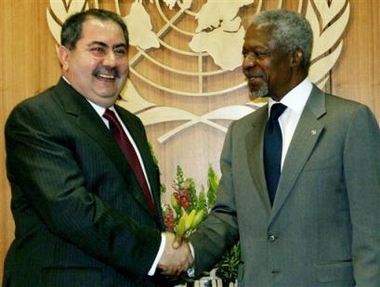 Annan Fires Staffer in Oil-For-Food Case
Annan Fires Staffer in Oil-For-Food Case
|
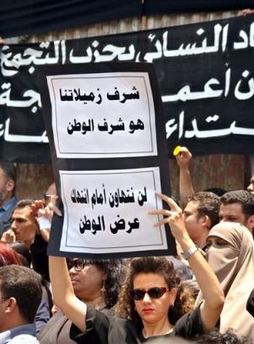 Egypt Interior Minister's Firing Sought
Egypt Interior Minister's Firing Sought
|
|
UNITED NATIONS - U.N. Secretary-General Kofi Annan fired a staffer for manipulating contracts under the Iraq oil-for-food program, the first dismissal to result from a U.N.-backed probe of the $64 billion humanitarian operation, a spokesman announced Wednesday.
Joseph Stephanides, a Cypriot diplomat and longtime U.N. staffer, was dismissed over accusations that he tainted the competitive bidding process for a company to inspect humanitarian goods entering Iraq under oil-for-food.
"Mr. Stephanides was advised accordingly yesterday and was separated from service with immediate effect," U.N. associate spokesman Stephane Dujarric said. Reached by The Associated Press after the announcement was made, Stephanides rejected the charges and vowed to appeal. Stephanides, who had planned to retire in September when he turns 60, has two months to appeal.
"I am very disappointed by this decision," Stephanides told The AP. "I look to the appeal process in the confident hope that justice will be made and I will be exonerated because I have committed no wrongdoing."
|
CAIRO, Egypt - Egyptian journalists and demonstrators angrily protested against the interior minister Wednesday, demanding he be fired over allegations he permitted sexual assaults on female journalists and protesters during last week's referendum vote.
The women were beaten, groped and sometimes stripped of their clothes while protesting or covering the May 25 referendum that approved a constitutional amendment allowing for multi-candidate presidential elections, witnesses said.
The approximately 1,000 protesters carried posters of Interior Minister Habib el-Adly, with an X across his face and the words: "Make him resign." The also carried black banners reading "Fire the minister of interior" and "Put these criminals on trial and punish them."
The Interior Ministry would not comment on the protest when contacted by The Associated Press. But a government official said Egypt's general prosecutor had opened an investigation into the alleged assaults and had begun questioning victims and eyewitnesses.
|
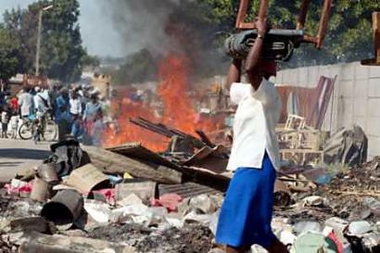 Zimbabwe arrests 22,000 people in shantytown blitz
Zimbabwe arrests 22,000 people in shantytown blitz
|
 Israeli Troops Set to Pull Back from Jericho
Israeli Troops Set to Pull Back from Jericho
|
|
HARARE (Reuters) - Zimbabwe police have arrested more than 22,000 people as a blitz on illegal stores and shantytowns gathers pace, sending homeless people fleeing to the countryside, the state Herald newspaper said Wednesday.
The United States warned Zimbabwe President Robert Mugabe's government the crackdown could lead to a violent backlash.
Zimbabwe's official Herald newspaper said police had arrested 22,735 people in a campaign the main opposition Movement for Democratic Change (MDC) has called a political vendetta against residents of its urban strongholds.
In a statement, State Department spokeswoman Nancy Beck noted that police had clashed with shanty-dwellers during the exercise and warned its citizens in the country to be cautious.
"The arrests have been widespread and are creating the potential of a violent backlash from the affected communities," Beck said. "However, law and order has not broken down."
The MDC leader, Morgan Tsvangirai, whose party gains overwhelming support from urban areas, denounced the crackdown and repeated calls for people to mobilize resistance.
|
JERICHO, West Bank (Reuters) - Israeli forces were set to pull back from Jericho on Wednesday, a move that could bolster Palestinian leader Mahmoud Abbas in his talks with militants on extending their informal truce with Israel. It was agreed that after a joint tour by Israeli and Palestinian brigade commanders (on Wednesday) the handover of the city of Jericho will begin," a senior Israeli officer said after military teams from both sides met late on Tuesday.
He estimated the repeatedly delayed pullback from the West Bank city, largely calm throughout most of a Palestinian uprising that erupted in 2000, was likely to start around 1100 GMT.
The Israeli officer, who declined to be identified, said Jericho would be transferred to "full Palestinian security control" but Israeli forces would remain at a key intersection on a highway leading to the biblical, oasis town.
Israeli Prime Minister Ariel Sharon (news - web sites) has pledged to move troops away from four other West Bank cities -- Tulkarm, Ramallah, Qalqilya and Bethlehem -- in confidence-building gestures to Abbas.
Peace hopes have risen since the moderate Palestinian leader, elected president on Jan. 9 to replace the late Yasser Arafat (news - web sites), declared a ceasefire along with Sharon at a ground-breaking summit in Sharm el-Sheikh, Egypt last month.
ABBAS TALKS TO MILITANTS
Abbas opened talks in Cairo on Tuesday with about a dozen Palestinian militant groups, hoping to persuade them to extend their de facto truce with Israel. The factions said any ceasefire depended on what Israel had to offer.
The militant groups Hamas and Islamic Jihad have demanded a timetable for an Israeli troop withdrawal and prisoner release as part of a package including a suspension of attacks on Israel, possibly for three months.
Abbas told the opening session of the meeting the agreement on what he called calm with Israel had already produced benefits, but said the Jewish state must fulfil its side of the deal reached at Sharm el-Sheikh.
The Jericho handover had been delayed several times by differences over the number of checkpoints Israel would dismantle on roads leading to the town, once a popular spot for Israelis who flocked to its casino.
|
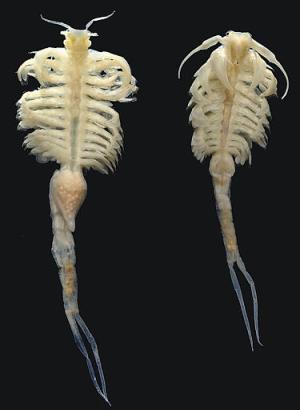 New Fairy Shrimp Species Found in Idaho
New Fairy Shrimp Species Found in Idaho
|
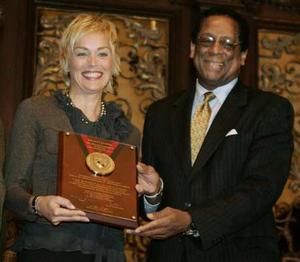 AIDS Cocktails Prevent Cancer, Study Finds
AIDS Cocktails Prevent Cancer, Study Finds
|
|
BOISE, Idaho - Biologists with the Idaho National Guard have discovered a new species of fairy shrimp living in the oft-dry lake beds of Idaho's desert. Though they look delicate enough to match their name, they are strong enough to survive, unhatched, for years in the baking heat of summer and the frozen tundra of winter until enough rain falls and the pools return. Once they awaken they live a few frenzied weeks, mating and leaving behind tiny cyst-like offspring, and die.
"This is a large, predatory fairy shrimp. This guy is about three inches long. That is huge for a fairy shrimp," biologist Dana Quinney said Tuesday during a press conference announcing the discovery.
There are already about 300 species of fairy shrimp worldwide, Quinney said, but only three other species boast the size of the newly discovered ones. Though the animals have been given a Latin name, Quinney is reluctant to reveal it until an article describing the species is published in a scientific journal, possibly next winter.
Dana Quinney and a colleague, Jay Weaver, first noticed the carnivorous shrimp in 1996. It took them nearly 9 years to compare the animal to the existing species and realize they had something entirely different.
"If you're just a little biologist like me, you're kind of a generalist," she said. "Many species of fairy shrimp look very much alike and it not only takes an expert but it takes an expert and a good microscope to tell them apart. This one is really, really, really different from all the other species in the world."
|
WASHINGTON (Reuters) - Drug cocktails taken to control the AIDS (news - web sites) virus may not only keep patients healthy but may protect them against some cancers caused by the infection, international researchers said on Tuesday. Chair of the American Foundation for AIDS (news - web sites) Research Campaign and actress Sharon Stone (L) accepts the Harvard Foundation Humanitarian Award from Dr. S. Allen Counter, director of the Harvard Foundation, at Harvard University in Cambridge, Massachusetts, March 14, 2005. Stone was presented with the award for her AIDS activism. REUTERS/Brian Snyder
The drug mixtures, called highly active antiretroviral therapy or HAART, suppress the deadly and incurable virus and help prevent pneumonia and other infections caused when HIV (news - web sites) is left free to destroy the immune system.
HAART also prevents some cancers, according to Gary Clifford of the International Agency for Research on Cancer in Lyon, France, and colleagues. The IARC is associated with the World Health Organization (news - web sites).
They analyzed the records of more than 7,300 Swiss HIV patients and found those on HAART had lower risks of Kaposi's sarcoma and non-Hodgkin's lymphoma compared with those who did not use HAART.
Nonetheless, Kaposi's sarcoma -- a cancer marked by red skin lesions and one of the hallmarks of full-blown AIDS -- was 20 times more common in HIV patients than in the general population. So was non-Hodgkin's lymphoma, a cancer of the lymphatic system.
And the HIV patients still had a higher than usual risk of anal cancer, Hodgkin's lymphoma, cervical cancer, liver cancer, cancer of the lip, mouth, and pharynx, and non-melanoma skin cancer, the researchers reported in the Journal of the National Cancer Institute (news - web sites).
|
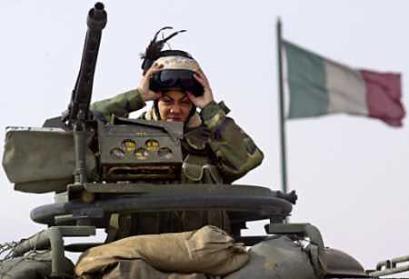 Italy Says Will Start Withdrawing Troops from Iraq
Italy Says Will Start Withdrawing Troops from Iraq
|
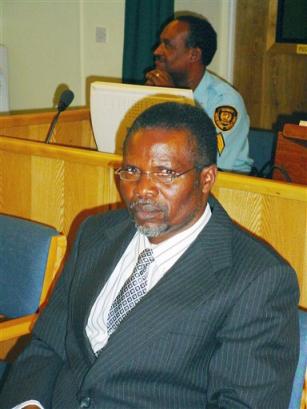 U.N. Tribunal Jails Ex-Rwandan Official
U.N. Tribunal Jails Ex-Rwandan Official
|
|
ROME (Reuters) - Leading U.S. ally Italy said on Tuesday it would start withdrawing its soldiers from Iraq (news - web sites) in September, in a fresh blow to President Bush (news - web sites)'s shrinking coalition
Prime Minister Silvio Berlusconi, one of Bush's most vocal supporters, said he was in talks with British Prime Minister Tony Blair (news - web sites) about a total exit strategy from Iraq, adding people in both countries wanted their troops to return home.
"We will begin to reduce our contingent even before the end of the year, starting in September, in agreement with our allies," said Berlusconi, who faces an election next year and went against public opinion to deploy troops in Iraq.
Asked on RAI state television when a total withdrawal would take place, Berlusconi said: "It will depend on the capacity of the Iraqi government to provide adequate security."
Despite strong opposition at home, Berlusconi sent some 3,000 troops to Iraq -- the fourth largest foreign contingent after U.S., British and South Korean forces.
But pressure has mounted on him to withdraw the troops since intelligence agent Nicola Calipari was killed earlier this month by U.S. soldiers shortly after rescuing an Italian hostage.
The incident has strained Italy's relations with the United States and Bush has promised an investigation.
"SERIOUS MISTAKE"
"(Bush) knows that he can't let down a loyal ally," said Berlusconi, adding that the killing was a "serious mistake."
"I've spoken at length about (a total exit strategy) personally with Tony Blair, saying that we should make a precise exit strategy because the public opinion of our countries expects this information," said Berlusconi. No immediate comment was available from Britain, which has the second largest number of troops in U.S.-led forces in Iraq.
Berlusconi had stood by Bush as other U.S. allies announced plans to pull out of Iraq. Spain withdrew last year and more recently the Netherlands, Poland and Ukraine have said they propose bringing their forces home this year.
Earlier on Tuesday, Bulgaria's president said his country should withdraw its 450 troops from Iraq by the end of this year after a Bulgarian soldier was accidentally killed by U.S. forces. A final decision is expected by the end of the month.
|
ARUSHA, Tanzania - A U.N. tribunal sentenced a former local government official in western Rwanda to six years in prison Monday after he pleaded guilty to committing crimes against humanity and apologized for his role in the 1994 genocide.
Vincent Rutaganira, 60, was accused of directing police and extremist Hutu militias to kill thousands of Tutsis who had sought refuge in a church in Rwanda's western Kibuye province.
Rutaganira, who was a councilor in Kibuye, was initially charged with 19 counts of genocide, crimes against humanity and violations of the Geneva Conventions.
Last year, prosecutors agreed to reduce the charges to one count of crimes against humanity by extermination in exchange for a guilty plea. Rutaganira was only the fourth person to plead guilty before the International Criminal Tribunal for Rwanda.
More than 500,000 people, most of them minority Tutsis, were killed in the genocide.
During the trial, Rutaganira admitted he did not try to protect Tutsi who sought refuge in his locality, and expressed remorse for the killings.
The International Criminal Tribunal for Rwanda has convicted 21 people and acquitted three, since it was set up in November 2004. Currently 25 people are on trial 18 others waiting.
|
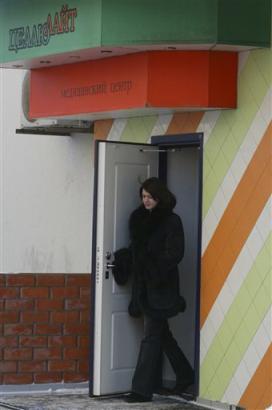 Stem-Cell Craze Spreads in Russia
Stem-Cell Craze Spreads in Russia
|
 J.Lo Comes Clean: She Is, in Fact, Married
J.Lo Comes Clean: She Is, in Fact, Married
|
|
MOSCOW - While scientists worldwide are only studying stem cells, dozens of Russian clinics and beauty salons claim they are already using both adult and embryonic stem cells to treat everything from wrinkles to Parkinson's disease (news - web sites) to impotence.
Scientists warn that while stem cells are still being researched in laboratories, treatment by clinics claiming to use stem cells may cost patients their health and fortunes. Moreover, they say, even though it's illegal, enforcement is lax and no one knows if the injections patients are getting contain stem cells.
When Svetlana Galiyeva found a clinic offering to treat her multiple sclerosis with embryonic stem cells, she grabbed the opportunity. Twenty-thousand dollars later she is still in a wheelchair and desperate. And there is no proof her injections had anything to do with stem cells.
Stem cells are the building blocks of the human body ≈ immature cells that can grow into bone, muscle and other tissues. They are plentiful in the embryo and fetus and are believed to be more versatile than stem cells from adult bone marrow and fat. But embryonic stem cells are controversial because they involve destruction of human embryos.
In leading clinics around the world, most stem cell research is limited to the lab dish and animals. In Russia, however, it's a different story.
Galiyeva, a 40-year-old gynecologist in the Ural Mountains city of Perm, developed multiple sclerosis nine years ago. She gradually lost control over her muscles and was enduring nearly constant muscle spasms, leaving doctors pessimistic about her ability to recuperate. "I understood what was awaiting me. It was either death or ...," Galiyeva said by telephone from Perm.
|
NEW YORK - Jennifer Lopez (news) has confirmed that she and Marc Anthony are, indeed, husband and wife. Yes, we're married," Lopez tells People magazine, on newsstands Friday. "I mean, come on, everyone knows. It's not a secret." It was the first public acknowledgment of her union with the salsa singer ьёб╒ц╒Б─ б╛ц╒Б┌╛Б─▄ an unusually long delay considering the ceremony was last June at her Beverly Hills, Calif., home. The couple performed a duet, though, at the Feb. 13 Grammy Awards show. Lopez says she was ailing from swollen glands and a sore throat during the performance, which caused her to cancel a London trip to promote the British release of her film "Shall We Dance?"
Though the trip cancellation prompted some speculation of pregnancy, Lopez says she's "not on a timetable" to have a baby ьёб╒ц╒Б─ б╛ц╒Б┌╛Б─▄ though she hopes to become a mother someday.
Now, the 34-year-old says, she's entered "phase two": a less public, a "little bit suburban" life with Anthony ьёб╒ц╒Б─ б╛ц╒Б┌╛Б─▄ and a far cry from her "Bennifer" days with former fiance Ben Affleck (news). But Lopez counts the high-profile romance as a learning experience.
"I take responsibility for the fact that I didn't make adjustments," she says. "Now I'm a little more careful. I travel in a certain way. I leave at a certain time. I learned." Lopez's new album, "Rebirth," will be released Tuesday.
|
 Are you crazy
Are you crazy
|
 Flag of Burundi
Flag of Burundi
|
|
Are you crazy?? Posted by: John Baptist Posted on: January 24, 2005, 11:22 AM PST OK here is a list as to why i think you could be crazy
1.) Would the dell be that price if it wasn't for the mac mini? (I'm
not sure if it was that cheap b4, please clarify) if not then u can
thank apple for that.
2.) The software you get is WordPerefct, and Windows Home
edition ooohhh!! lets face it how much money would you spend
to get the equivalent software for a p.c and have it work and be
stable?
3.) You only get a cd rom, you have to pay to upgrade to a cdrw
or more for a cdrw/dvd drive, the cdrw/dvd drive in the mini is
standard. It also makes no mention of the graphics card or what
ports it supports (usb2, firewire, wirless, bluetooth etc, where's
that info?)
4.) You still only get 256mb of ram and the following is the dell
recomendations from there site as to what you can use it
for....(pretty lame)
RECOMMENDATIONS:
If you plan to: Purchase:
Run only 1 or 2 basic programs at once. 256MB
Run several programs at once or plan to edit photos.512MB/1GB
Plan to do intensive gaming or complex video editing, or want
headroom for the future. 2GB - 4GB
Now there are options to upgrade on the mini I'm not suggesting
that you edit video with 256mb of ram although I'm sure its do-
able, its probably not the most productive experience. I do
however know that for a fact my mac mini (out of box) can edit
photos whilst playing a dvd and running the internet (something
to do with a well written OS I believe), all at the same time
without a hicup. I didn't have to buy any anti virus software
either.
5.) I have an elgato usb t.v box (a little smaller than the mini)
that takes a seperate video and audio output from my digital
cable box so that I can schedule and record T.V whenever
(turning my mac into a Tivo) i want in the very file efficient
quality retaining mpeg 4 standard, so an hour of high quality
recording for playback on my T.V is only 480 mb.
6.) Its design is perfect for me to sit next to my widescreen t.v
without giving my wife a reason to question my tech obsession,
try puting that dell next to your T.V and see what a great
addition to the room it is (lol).
There are many more facts/reasons but well, to be
honest....these should easily be enough for you to realize that
its not evangelism for the mini, just common sense with style
|
1300s - Hutu people settle in the region, imposing their language and culture on the original inhabitants, the Twa. 1400s - Tutsi settlers establish themselves as feudal rulers.  | BUJUMBURA Much of the civil war has been played out in Burundi's capital Population: 314,000 (World Health Organization, 2000) |
1858 - British explorers Richard Burton and John Speke visit Burundi.1890 - The Tutsi kingdom of Urundi and neighbouring Ruanda (Rwanda) incorporated into German East Africa. 1916 - Belgians occupy the area. 1923 Belgium granted League of Nations mandate to administer Ruanda-Urundi. 1959 - Influx of Tutsi refugees from Rwanda following ethnic violence there. Independence
1962 - Urundi is separated from Ruanda-Urundi, becomes Burundi and is given independence as a monarchy under King Mwambutsa IV.
1963 - Thousands of Hutus flee to Rwanda following ethnic violence.
1965 - King Mwambutsa refuses to appoint a Hutu prime minister even though Hutus win a majority in parliamentary elections; attempted coup by Hutu police led by Michel Micombero brutally suppressed.
1966 July - Mwambutsa deposed by his son, Ntare V.
1966 November - Micombero stages a second coup, this time successfully, and declares himself president.
Overthrow of monarchy
1972 - Some 150,000 Hutus are massacred after Ntare V is killed, supposedly by Hutus.
 |
MELCHIOR NDADAYE
Assassination of Hutu president set off a wave of violence
| 1976 - Micombero is deposed in a military coup and is replaced by Jean-Baptiste Bagaza as president.
1981 - A new constitution makes Burundi a one-party state.
1987 - President Bagaza is deposed in a coup led by Pierre Buyoya.
1988 - Thousands of Hutus are massacred by Tutsis and thousands more flee to Rwanda.
Dashed hopes
1992 - New constitution providing for a multiparty system is adopted in a referendum.
1993 June - Melchior Ndadaye, a Hutu, beats Pierre Buyoya in the country's first ever presidential election to become Burundi's first Hutu president.
1993 October - Ndadaye is assassinated by pro-Bagaza paratroopers, provoking more massacres.
1994 - Parliament appoints Cyprien Ntaryamira - a Hutu - as president; Ntaryamira is killed in a plane crash together with his Rwandan counterpart; more ethnic violence and refugees fleeing to Rwanda; parliament speaker Sylvestre Ntibantunganya appointed president.
1995 - Massacre of Hutu refugees leads to renewed ethnic violence in the capital, Bujumbura.
1996 - Pierre Buyoya stages a second coup, deposing Ntibantunganya and suspending the constitution.
Buyoya sworn in
1998 - Buyoya and parliament agree on a transitional constitution under which Buyoya is formally sworn in as president.
1999 - Talks between warring factions held under the auspices of former Tanzanian President Julius Nyerere.

Fighting has displaced hundreds of thousands of Burundians | 2000 - Government and three Tutsi groups sign a ceasefire accord, but two main Hutu groups refuse to join in.
2001 January - President Buyoya agrees to ceasefire talks with leader of main ethnic Hutu rebel group, Forces for Defence of Democracy (FDD).
2001 10 March - Army says it has regained control of the capital after two weeks of fighting with Hutu rebels.
2001 April - Coup attempt fails.
2001 July - Defence minister says authorities have put down an attempted coup.
Transitional government
2001 October - Talks brokered by Nelson Mandela lead to installation of transitional government under which Hutu and Tutsi leaders will share power. Main Hutu rebel groups refuse to sign ceasefire and fighting intensifies.
 |
POWER SHARING
Domitien Ndayizeye (l) takes over from Pierre Buyoya (r)
|
2001 25 December - Army says it killed more than 500 rebels in operation against opposition stronghold near Bujumbura.
2002 January - Jean Minani, leader of main Hutu party Frodebu, elected president of transitional national assembly set up to bridge ethnic divide.
2002 July - Upsurge in fighting delays planned peace talks; army says more than Hutu 200 rebels have been killed in clashes.
2002 December - Government and main Hutu rebel group FDD sign ceasefire at talks in Tanzania under which rebels will join new national army. But renewed fighting breaks out in January 2003.
2003 30 April - Domitien Ndayizeye - a Hutu - succeeds Pierre Buyoya as president, under terms of three-year power-sharing government inaugurated in 2001.
2003 July - Major rebel assault on Bujumbura. Some 300 rebels and 15 government soldiers are killed. Thousands flee their homes.
2003 November - President Ndayizeye and FDD leader Pierre Nkurunziza sign agreement to end civil war at summit of African leaders in Tanzania.
 |
DEMOBILISATION
Disarming of former rebels could take years
|
Nkurunziza and other FDD members given ministerial posts. Smaller Hutu rebel group, Forces for National Liberation (FNL), remains active.
2004 June - UN force takes over peacekeeping duties from African Union troops.
2004 August - 20 parties sign deal on sharing power between Hutu rebels and Tutsi-led government and army; 11 parties fail to sign agreement.
Hutu rebels kill 160 Congolese Tutsi refugees at a camp near the DR Congo border. Burundian Hutu rebel group, the FNL, claims responsibility.
2004 December - UN and government begin to disarm and demobilise thousands of soldiers and former rebels.
2005 January - President signs law to set up new national army, incorporating government force and all but one Hutu rebel group.
|
What do you think?
Please let me know by signing my guest book.
|
|